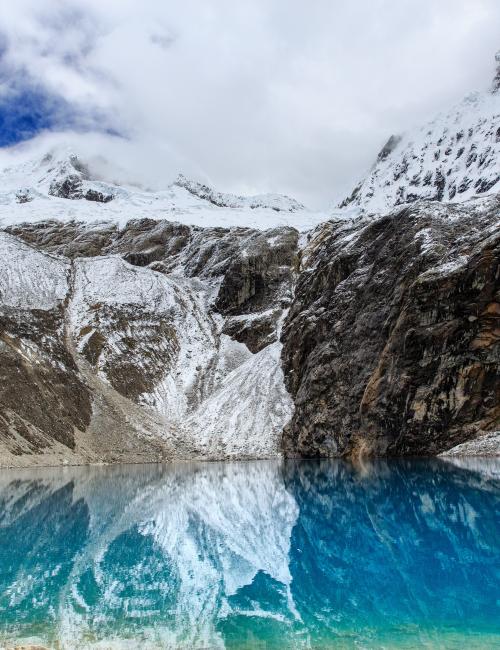Climate Science and Law
Overview
Our climate science and law group, led by Dr Rupert Stuart-Smith, conducts scientific and legal research that informs legal claims and policy. We focus on key climate governance issues: climate change impacts, equitable mitigation, and financial risk. We work with partners to understand emerging evidentiary questions that arise in climate lawsuits and policy development. We also consider how scientific evidence has been used and interpreted in past cases to facilitate improved use of scientific research in the courts.
Our current research focus areas are:
- Health attribution: We use methods from climate science, epidemiology and physiology to shed light on the impacts of climate change. Our work on health attribution includes participation in multi-year research initiatives: TACTIC and Visibilize4ClimateAction (with funding from the Wellcome Trust).
- Mitigation: How quickly should countries reduce their greenhouse gas emissions to meet their Paris Agreement commitments equitably? The answer to this fundamental question is not known precisely, an issue of critical policy and legal uncertainty. Our research clarifies the mitigation action needed by states if they are to act in concert with norms and principles of international law.
- Financial impact of legal action: litigation and regulatory enforcement action constitutes a growing financial risk to firms. However, these risks are rarely disclosed, and their impacts on companies are poorly understood. Our research addresses this gap.
Our work
Our work integrates climate science with legal research and practice. We are embedded in a large close-knit network of scientists around the world at the cutting edge of this field and actively collaborate with scientists from a range of different disciplines. Our research has identified current and potential barriers to, and opportunities for, using the latest scientific evidence in courts.
Our research advances methods in attribution science. We also support improved integration of climate science in legal argumentation to facilitate wider use of scientific evidence in litigation. To achieve these goals, our team works with strategic litigants to map and/or develop the evidence base for ongoing or future cases.
The growth in legal action around climate change offers opportunities to accelerate the transition to a net-zero economy but the financial implications of climate litigation remain poorly understood. We work with regulators, private-sector actors and leading academics across the University of Oxford and beyond to assess, quantify, and reveal the materiality of these risks.
What we've achieved
- SLP research led by Rupert Stuart-Smith was cited in the European Court of Human Rights judgement in KlimaSeniorinnen v. Switzerland, the first successful climate lawsuit before the European Court.
- Our research on legal limits to carbon dioxide removal was published in Science in 2023 and covered by various news outlets including Politico’s E&E News.
- Rupert Stuart-Smith advised the Philippines House Committee on Climate Change on a draft bill on Loss and Damage filed in the House of Representatives in November 2023.
- Fredi Otto was listed in Nature's ten people who helped shape science in 2021.
- Rupert Stuart-Smith’s research was spotlighted in an article for The Lancet Planetary Health – How scientists are helping sue over climate change.
- Arjuna Dibley was interviewed for a podcast with the Straits Times (national newspaper in Singapore) about climate adaptation. Green Pulse Podcast: Climate dictionary – What does adapting to climate change mean?
- Fredi Otto joined SLP affiliated members Joana Setzer and Lavanya Rajamani in a panel discussion - Climate Court: Cases of Climate Justice (video in link) - at the New York Times Climate Hub, COP26, 8th November 2021.
- Our research on the influence of climate change on extreme weather events has been widely covered by the global media, including the FT, New York Times, and BBC. Our work providing attribution-science evidence in the context of ongoing litigation in Germany and a petition to the International Criminal Court has also received specific coverage.
- Our research on the role of attribution science in the courts was launched at a panel event, and featured in the press, including the BBC, FT, Carbon Brief, and The Guardian and was covered in BBC Radio interviews on The Climate Question and Science in Action).
- Rupert Stuart-Smith's work on the impact of climate change on glacial retreat in Peru appears in a January 2023 report from the Royal Geographical Society: 'Geographers and legal impact: Scoping the field'. The programme is cited as exemplary of how geographical research is being used to achieve impact in legal settings.
Recent research highlights
- Stuart-Smith, R. F., Otto, F. E. L., & Wetzer, T. (2024). Liability for Climate Change Impacts: the Role of Climate Attribution Science. In E. de Jong (Ed.), Corporate Accountability and Liability for Climate Change (pp. 205–233). Edward Elgar. https://doi.org/10.4337/9781035333226
- Wetzer, T., Stuart-Smith, R.F., & Dibley, A. (2024). Climate-related risk assessments must engage with the law. Science, 383(6679), 152-154. https://www.science.org/doi/10.1126/science.adj0598
- Stuart-Smith, R.F., Rajamani, L., Rogelj, J., Wetzer, T. (2023). Legal limits to the use of CO2 removal to meet climate goals. Science, 382(6672), 772-774. https://www.science.org/stoken/author-tokens/ST-1557/full
- Hale, T., Wetzer, T., Abebe, S.K., Allen, M.R., Amel-Zadeh, A., Armour, J., Axelsson, K., Caldecott, B., Dias, L., Fankhauser, S., Franta, B., Hepburn, C., Mbeva, K., Rajamani, L., Smith, S., Stuart-Smith, R.F. (2024). Turning a groundswell of climate action into ground rules for net zero. Nature Climate Change, 14, 306-308. https://dx.doi.org/10.1038/s41558-024-01967-7
- Nepal, S., Steiner, J.F., Allen, S., Azam, M.F., Bhuchar, S., Biemans, H., Dhakal, M., Khanal, S., Li, D., Lutz, A., Pradhananga, S., Ritzema, R., Stoffel, M., & Stuart-Smith, R.F. (2023). Consequences of cryospheric change for water resources and hazards in the Hindu Kush Himalaya. In ICIMOD (P. Wester, S. Chaudhary, N. Chettri, M. Jackson, A., Maharjan, S. Nepal, J.F. Steiner [Eds.]), Water, ice, society, and ecosystems in the Hindu Kush Himalaya: An outlook (pp. 73-121). ICIMOD. https://doi.org/10.53055/ICIMOD.1031
- Clarke, B. J., Otto, F. E. L., Stuart-Smith, R. F., & Harrington, L. J. (2022). Extreme weather impacts of climate change: an attribution perspective. Environmental Research: Climate, 1(1), 012001. https://doi.org/10.1088/2752-5295/ac6e7d
- Otto, F.E.L. et al., Causality and the fate of climate litigation: The role of the social superstructure narrative, Global Policy (2022).
- Stuart-Smith, R.F., Otto, F.E.L., Saad, A., Lisi, G., Minnerop, P., Lauta, K.C., van Zwieten, K., & Wetzer, T. (2021). Filling the evidentiary gap in climate litigation. Nature Climate Change, 11. Report for practitioners available in English and Spanish.
- Stuart-Smith, R.F., Clarke, B.J., Harrington, L.H. and Otto, F.E.L. (2021) Global Climate Change Impacts Attributable to Deforestation driven by the Bolsonaro Administration: Expert report for submission to the International Criminal Court. Oxford Sustainable Law Programme. 1-97.
- Minnerop, P. and Otto, F. (2020) Climate change and causation: Joining law and climate science on the basis of formal logic. Buffalo Journal of Environmental Law, 27.
- Stuart-Smith, R.F., Roe, G.H., Li, S. and Allen, M.R. (2021) Increased outburst flood hazard from Lake Palcacocha due to human-induced glacier retreat. Nature Geoscience, 14: 85-90.
- Harrington, L.J. and Otto, F.E. (2019) Attributable damage liability in a non-linear climate. Climatic Change.
- Otto, F.E.L., Skeie, R.B., Fuglestvedt, J.S., Berntsen, T., Allen, M.R. (2017) Assigning historic responsibility for extreme weather events. Nature Climate Change, 7.
- Dr Solomon Gebrechorkos | Research Associate, Climate change impacts in east Africa
- Dr Mireia Ginesta | Research Associate, Climate Damages Analysis
- Prof. Thom Wetzer | Associate Professor of Law and Finance, Faculty of Law; Director, Oxford Sustainable Law Programme
- Lucy Temple | Research Assistant, Attribution of climate change impacts on health
- Ewan White | DPhil candidate, Legal limits to CO2 removal to meet climate goals
- Nele Schuldt | Honorary Research Associate, Human Rights Centre, University of Ghent
- Anna Galmiche | Visiting Student, Faculty of Law, University of Neuchâtel
Contact us
If you have any questions about this workstream, would like to learn more, or want to get involved: please contact Rupert Stuart-Smith. For general questions about the programme please email Oxford Sustainable Law Programme information.


